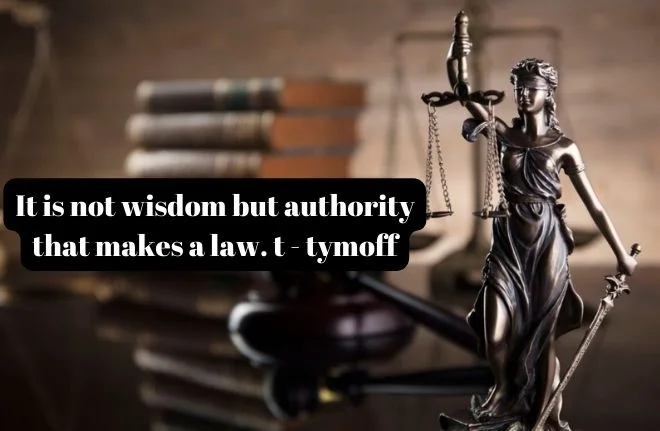The interplay between wisdom and authority is often scrutinised in the complex tapestry of societal governance and legal frameworks. The phrase “It is not wisdom but authority that makes a law. t – Tymoff encapsulates a profound critique of the mechanisms by which laws are formulated, enacted, and enforced. This article embarks on an exploratory journey to dissect the essence of this statement, delving into historical contexts, theoretical underpinnings, and contemporary manifestations of the relationship between wisdom, authority, and law.
The Historical Context
To understand the depth of Tymoff’s assertion, it’s essential to embark on a historical journey, tracing the evolution of legal systems across civilisations. Ancient societies, from the Code of Hammurabi in Babylon to the Roman Law, laid the foundational legal codification and enforcement principles. These early legal systems were predominantly shaped by the authority of rulers and elites rather than the populace’s collective wisdom or the philosophers’ insights. This historical perspective reveals a consistent pattern: authority, whether vested in monarchs, emperors, or religious leaders, has been the primary driver in the creation and imposition of laws.
Theoretical Underpinnings
Philosophical debates have long engaged with the law-making dichotomy between authority and wisdom. As envisaged in his works, Plato’s ideal republic argued for a society governed by philosopher-kings, where wisdom ideally would be the cornerstone of law. Contrastingly, Thomas Hobbes, in “Leviathan,” emphasised the necessity of an absolute sovereign to maintain order and legislate, underscoring the importance of authority over wisdom. These theoretical discourses highlight a fundamental tension: the ideal of law as a manifestation of collective wisdom and ethical reasoning versus the pragmatic recognition of law as an instrument of authority and control.
Authority in Law-Making
The mechanism of law-making in contemporary societies often underscores the importance of authority. In democratic systems, authority is ostensibly derived from the people’s will, with elected representatives tasked with creating laws. However, the process is complex and influenced by various factors, including political power dynamics, lobbying, and the interests of the elite. This reality questions the extent to which wisdom, in the form of ethical reasoning, empirical evidence, and public consensus, informs law-making. The prevalence of legislation that reflects the interests of a powerful minority rather than the collective wisdom or ethical considerations underscores It is not wisdom but authority that makes a law. t – Tymoff assertion.
The Role of Wisdom in Legal Systems
While authority is the mechanism through which laws are enacted, the role of wisdom must be partially discounted. Judicial systems often rely on a broader understanding of justice, ethics, and societal values in interpreting and applying statutes. The wisdom of judges, legal scholars, and the collective conscience of society plays a crucial role in shaping how laws are understood and implemented. Moreover, the evolution of legal systems reflects a gradual incorporation of wisdom-based principles such as human rights, equality, and environmental stewardship. Thus, while authority enacts laws, wisdom influences their direction and interpretation.
Contemporary Challenges and Critiques
In the modern era, the tension between authority and wisdom in law-making is evident in several contentious areas. Issues such as digital privacy, environmental legislation, and social justice highlight the complexities of legislating in an ever-changing world. The rapid pace of technological advancement and shifting societal norms challenge traditional authoritative structures, calling for a more wisdom-oriented approach to law-making that incorporates expert knowledge, ethical considerations, and public opinion. The critique embedded in Tymoff’s statement thus remains relevant, as it prompts a reevaluation of how laws are made and whose interests they serve.
Authority vs Wisdom: Finding a Balance
Pursuing a legal system harmoniously blends authority and wisdom is an ongoing challenge. It requires mechanisms that ensure those in positions of authority are informed by a broad spectrum of wisdom, including scientific knowledge, ethical reasoning, and the lived experiences of diverse populations. Engaging public participation in the law-making process, enhancing the transparency and accountability of legislative bodies, and fostering an independent judiciary are steps towards achieving this balance. Furthermore, education and public discourse play vital roles in cultivating a society that values authority and wisdom in its legal and governance systems.
Conclusion
The assertion, “It is not wisdom but authority that makes a law. t – Tymoff,” is a poignant reminder of the complexities and imperfections inherent in our legal and governance systems. While authority, by necessity, plays a central role in the enactment and enforcement of laws, the incorporation of wisdom is essential for the creation of a just, equitable, and forward-looking society. The challenge, then, is to maintain the role of authority in law-making and to ensure that such authority is exercised with wisdom, guided by ethical principles, and responsive to the needs and aspirations of all members of society. As we move forward, the dialogue between authority and wisdom in law-making must continue, evolving to meet the challenges of our times while striving for a balance that serves the common good.
